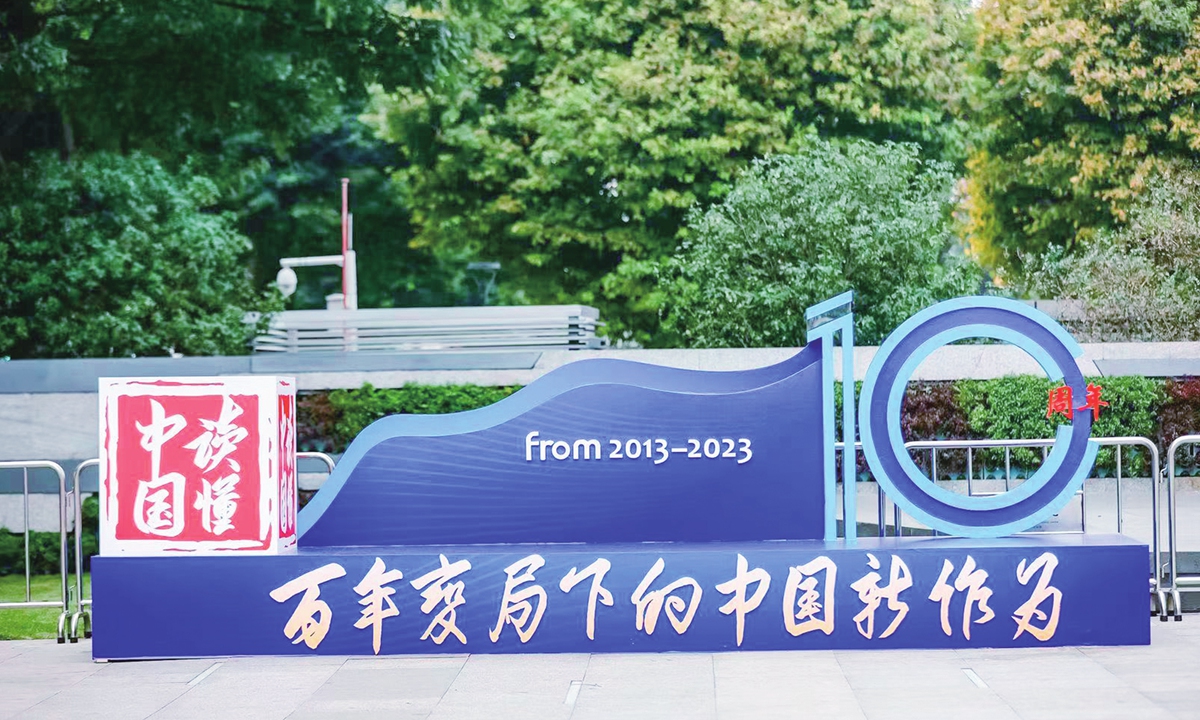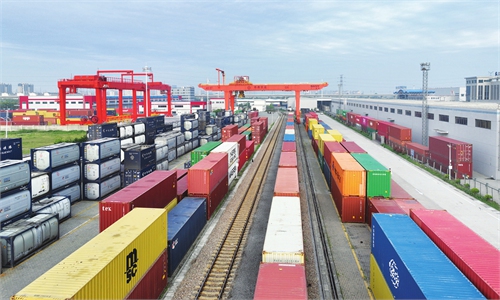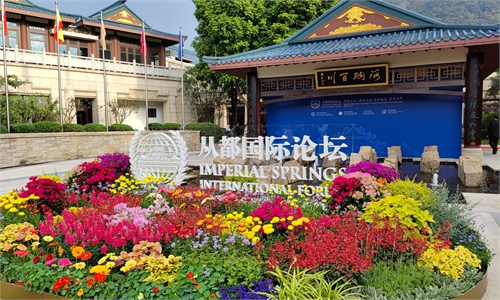Chinese modernization a gift that benefits the developing world

The Understanding China Conference is held in Guangzhou from December 1 to 3, 2023. Photo: ddzg.ciids.cn
Editor's note:The Understanding China Conference was held in Guangzhou from Friday to Sunday. During the conference, Chinese President Xi Jinping sent a congratulatory letter, in which he stated "to understand China, the key lies in understanding Chinese modernization." Through the lens of participating foreign pundits, we examine the connotation and significance of Chinese modernization.
In a conversation with Global Times (GT) reporter Ma Ruiqian, Zafar Uddin Mahmood (Mahmood), former special Pakistani envoy for the China-Pakistan Economic Corridor, David Ferguson (Ferguson), honorary chief English editor of Foreign Languages Press, Martin Jacques (Jacques), a visiting professor at the Institute of Modern International Relations at Tsinghua University and a senior fellow at the China Institute, Fudan University, Essam Sharaf (Sharaf), former prime minister of Egypt, and Mushahid Hussain Syed (Syed), chairman of the Pakistani Senate's Defense Committee and chairman of the Pakistan-China Institute, shared their views on how to understand China as well as Chinese modernization.
GT: How do you interpret "to understand China, the key lies in understanding Chinese modernization?"
Mahmood: President Xi's letter once again emphasizes the significance he places on the idea of understanding China and underscores his desire to further promote this understanding. Chinese modernization needs to be conveyed to the world. Chinese modernization is unbelievable. However, so many people don't believe it because they lack knowledge about it. Therefore, it is essential to make Chinese modernization credible by telling them the stories of contemporary China, rather than solely focusing on its historical aspects from thousands of years ago.
Jacques: The modernization process in China is highly significant and a central focus for China and our time. It has entered a new and distinctive phase that goes beyond merely catching up with other countries. I believe that understanding China is bigger than understanding Chinese modernization. China is deeply rooted in historical characteristics, notably being a civilization state, which has profoundly shaped its socio-economic features over an extended historical period. For instance, the relationship between the state and society in China differs significantly from that in nation-states like the US, the UK, or France. Therefore, understanding China means understanding a lot of things, and it has to be rooted in an understanding of the fundamental historical features of China.
GT: What do you think are the characteristics of Chinese modernization?
Sharaf: Chinese modernization is a miracle, achieving remarkable accomplishments in a short period. This development has not only brought significant changes to the Chinese people but has also had a profound impact on the development of other countries. This miracle is unparalleled and occurred under the leadership of the Communist Party of China (CPC). The CPC's leadership has been a tremendous driving force for China's economic development. The Party has demonstrated its ability to grasp the whole situation and control the development of the whole of China during a time of unprecedented changes. Under its leadership, China has not only created opportunities for its own people but has also offered the world and the era extensive prospects for development and cooperation on a deep level.
Syed: Currently, there are two distinct narratives and worldviews prevailing in the world. One narrative, championed by the US and other Western countries, emphasizes security, military dominance, and discussions of conflicts and confrontation. On the other hand, China is promoting a vision of modernization that differs from what the US is pursuing, and this vision is widely accepted and supported by the Global South. China's worldview is characterized by connectivity, cooperation, and inclusivity. It is more about respect for diversity and equality, guided by the principles of peaceful coexistence and collaboration. In China's path to modernization, everybody gains.
Mahmood: Chinese modernization is the shared prosperity of humanity. The people across the world will benefit from such development, which brings peace to the world. You can see the benefit of modernization and prosperity all over China, and I think the Chinese government and the Chinese leadership want to take this prosperity to the people of the world.
Ferguson: I believe the primary characteristic of Chinese modernization is that it is different from Western modernization. Western modernization, in my view, was built on what I refer to as three exploitations: the exploitation of the poor within their own countries, the exploitation of other countries through colonialism, and the outright looting and invasion along with the exploitation of the environment. Chinese modernization, on the other hand, doesn't follow the same path.
China's approach to modernization, in terms of its own people, centers on shared development. Unlike Western countries, China doesn't have an exploited working class enduring poverty to enrich a small elite. Chinese modernization is about shared development, about everybody rising. It is not about exploiting other countries; it is about helping other countries to develop through initiatives like the Belt and Road Initiative (BRI). The BRI operates on a win-win approach, which means we've been successful in our development, we can help you to be successful in your development, and your success can be a feedback to us.
Chinese modernization recognizes that economic development alone cannot occur without considering its impact on a deteriorating and wounded environment. Over the last decades, China has been engaged in a modernization process that encompasses economic development while also incorporating social and environmental considerations.
Jacques: I think one of the characteristics of Chinese modernization, which is profoundly different from Western modernization, is that while Western modernization was really built on exploiting the rest of the world through colonialism, Chinese modernization builds a very close and constructive relationship with the developing world. Chinese modernization is actually a gift that benefits the developing world, where the great majority of the world's population lives, whereas Western modernization was really about suppressing.
GT: Faced with the growing Cold War mentality, what should China do to help the world better understand China as well as Chinese modernization and reduce understanding deficit?
Mahmood: The reform and opening-up in China have brought significant changes to the lives of ordinary people, making China a prominent story worldwide. However, there are widespread misperceptions and misunderstandings about China. It is not the people who are misinformed; rather, it is the media which is diverting them in the wrong direction and not telling them the real story. So it is crucial to tell the world what the real China is.
Conferences like "Understanding China" hold great significance as they play a crucial role in promoting and enhancing understanding between China and people worldwide. Given the rapid and substantial changes occurring in China, it becomes essential to portray these transformations accurately and realistically. Every time we attend this conference, we gain a lot. We can see many new changes in China, which further deepens our understanding of China across aspects. And if we understand it clearly, we will be able to go back to our own country and promote it to the people of our country.
Ferguson: The first and the most important thing to address understanding deficit is to stop misunderstanding. Misunderstanding is caused by a lack of information or inaccurate information. And the problem with misunderstanding can be addressed by rational means by giving more accurate information. The problem with the US is not misunderstanding; it's a deliberately created, orchestrated, engineered hostility that operates at a fundamentally emotional level. What China needs to do is find a way of engaging with people on the same emotional level that the problem has been created.
China needs to recognize that the political and media audience in the US is not listening. Instead of attempting to address an unresponsive audience, China should shift its focus to engage with a more receptive audience - ordinary people in the US. China needs to talk to ordinary people in the US, engaging with them on a human level by telling them stories and explaining to them that China is not their enemy.
What Chinese modernization is looking for are the same things that the ordinary Americans are looking for: a roof over our heads, food on the table, clothes on our backs, schools for our kids, safe streets, and a healthy environment. China is not trying to take these things away from others. China wants to find a way of working together so that we can all enjoy these outcomes.


